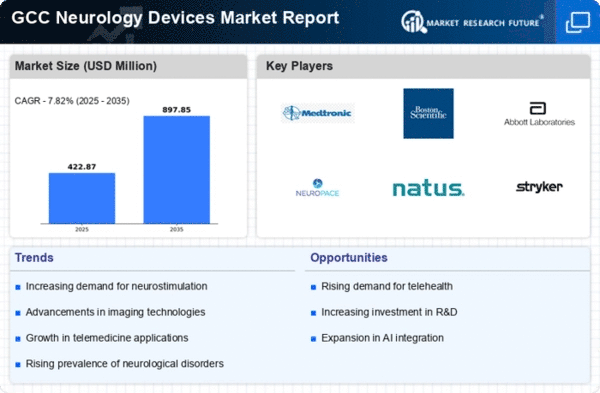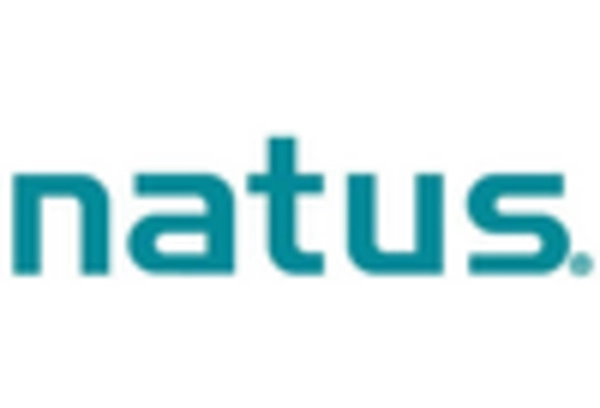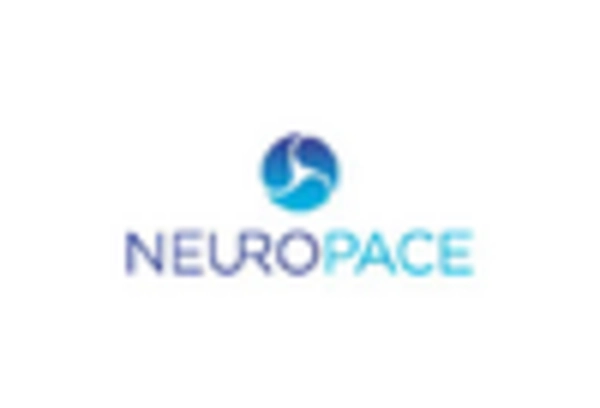Aging Population in the GCC
The demographic shift towards an aging population in the GCC is a crucial driver for the neurology devices market. As the population ages, the incidence of age-related neurological disorders is expected to rise, leading to increased demand for specialized medical devices. Reports indicate that by 2030, the proportion of individuals aged 65 and older in the GCC will reach approximately 15%, significantly impacting healthcare needs. This demographic trend necessitates the development and deployment of advanced neurology devices to cater to the growing number of elderly patients. Consequently, manufacturers are likely to focus on creating devices tailored to the unique needs of this population, further propelling market growth.
Government Initiatives and Funding
Government initiatives aimed at enhancing healthcare infrastructure in the GCC are significantly impacting the neurology devices market. Various national health programs are being launched to improve access to neurological care, which includes funding for advanced medical technologies. For instance, the GCC governments have allocated substantial budgets for healthcare improvements, with an estimated increase of 20% in healthcare spending over the next few years. This financial support is likely to facilitate the adoption of cutting-edge neurology devices, as hospitals and clinics upgrade their facilities to meet the growing demand for neurological services. Such initiatives not only enhance patient care but also stimulate market growth.
Rising Prevalence of Neurological Disorders
The increasing incidence of neurological disorders in the GCC region is a primary driver for the neurology devices market. Conditions such as epilepsy, Alzheimer's disease, and multiple sclerosis are becoming more prevalent, necessitating advanced diagnostic and therapeutic devices. According to recent health statistics, the prevalence of neurological disorders in the GCC is projected to rise by approximately 15% over the next five years. This surge in cases is likely to drive demand for innovative neurology devices, as healthcare providers seek effective solutions to manage these conditions. The growing awareness of neurological health issues among the population further emphasizes the need for specialized devices, thereby propelling the market forward.
Technological Innovations in Medical Devices
The neurology devices market is experiencing a wave of technological innovations that are transforming patient care. Advancements in neuroimaging, neurostimulation, and wearable devices are enhancing the capabilities of healthcare providers in diagnosing and treating neurological conditions. For example, the introduction of portable EEG devices and advanced MRI machines has improved diagnostic accuracy and patient outcomes. The market for neurology devices is expected to grow at a CAGR of 10% over the next five years, driven by these technological advancements. As healthcare professionals increasingly adopt these innovative solutions, the neurology devices market is likely to expand, offering new opportunities for manufacturers and suppliers.
Increased Awareness and Education on Neurological Health
There is a growing awareness and education regarding neurological health issues among the population in the GCC, which is positively influencing the neurology devices market. Public health campaigns and educational programs are being implemented to inform individuals about the importance of early diagnosis and treatment of neurological disorders. This heightened awareness is likely to lead to increased patient engagement and demand for neurology devices. As more individuals seek medical attention for neurological symptoms, healthcare providers are compelled to invest in advanced diagnostic and therapeutic devices. This trend is expected to contribute to the overall growth of the neurology devices market, as the focus on neurological health continues to expand.
















